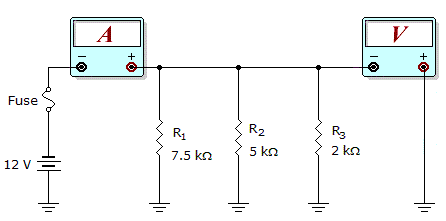Electronics - Parallel Circuits - Discussion
Discussion Forum : Parallel Circuits - General Questions (Q.No. 11)
11.

What would these meter readings indicate about the circuit in the given circuit?
Meter Readings: I = 7.6 mA, V = 12 V
Discussion:
17 comments Page 1 of 2.
Himanshu Verma said:
2 decades ago
Case1 :When R1 is open,
then the effective resistance R = R2||R3
i.e. 5K||2K = 10/7 K
then current I = V/R = (12*7)/10K = 8.4 mA(Which is not correct ans i.e 7.6 mA)
Case2 : When R2 is open,
then the effective resistance R = R1||R3
i.e. 7.5K||2K = 30/19 K
then current I = V/R = (12*19)/30K = 7.6 mA(Which is d correct ans i.e 7.6 mA)
Case3: When the fuse is open,
then it is not possible to obtain voltage of 12 V
So the correct answer is option [b].
then the effective resistance R = R2||R3
i.e. 5K||2K = 10/7 K
then current I = V/R = (12*7)/10K = 8.4 mA(Which is not correct ans i.e 7.6 mA)
Case2 : When R2 is open,
then the effective resistance R = R1||R3
i.e. 7.5K||2K = 30/19 K
then current I = V/R = (12*19)/30K = 7.6 mA(Which is d correct ans i.e 7.6 mA)
Case3: When the fuse is open,
then it is not possible to obtain voltage of 12 V
So the correct answer is option [b].
Saichaitanya said:
1 decade ago
CONSIDER THE FOLLOWING:
In Parallel circuit, the current will differ and the voltage will remain same across all the branches. In other words, the voltage across R1, R2 and R3 will be 12V each.
I1= 12/7.5K => 1.6mA
I2= 12/5K => 2.4mA
I3= 12/2K => 6.0mA
In above, the total current 7.6mA will take place correctly when only I1 and I3 present *(since, I1 + I3 = 7.6mA).
Hence, R2 must be discarded/ remove from the circuit. In other words, R2 is open.
In Parallel circuit, the current will differ and the voltage will remain same across all the branches. In other words, the voltage across R1, R2 and R3 will be 12V each.
I1= 12/7.5K => 1.6mA
I2= 12/5K => 2.4mA
I3= 12/2K => 6.0mA
In above, the total current 7.6mA will take place correctly when only I1 and I3 present *(since, I1 + I3 = 7.6mA).
Hence, R2 must be discarded/ remove from the circuit. In other words, R2 is open.
(2)
Mohan said:
1 decade ago
I agree with Saichaithanya.
Sudhansu said:
1 decade ago
Well done Saichaitanya and Himanshu Verma.
Shinoj said:
1 decade ago
@ Saichaitanya, Perfect explanation.
Sriram pn said:
1 decade ago
Saichaitanya perfect explanation
Suthan said:
1 decade ago
Fantastic Himanshu Verma & Saichaitanya ..Great work.
Gigi said:
1 decade ago
Do the total resistance in the cut by V/I that is 1.578.
Then do the total combination or resist ivory in parallel which resisters combination gives 1.578 ohms and other resistor is open.
Then do the total combination or resist ivory in parallel which resisters combination gives 1.578 ohms and other resistor is open.
Santosh said:
1 decade ago
Voltmeter is in parallel connection, so reading is 12V.
Now for resistance calculation which is connected parallel with 2k ohm resistance (R3):
Equivalent resis. R = 12V/7.6mA = (30/19)K ohm.
So, Rx ll R3 = (30/19)k.
or, (1/Rx)+ (1+R3) = 1/(30/19)k.
or, (1/Rx)+ (1/2) = (19/30).
or, (1/Rx) = (19/30)-(1/2).
or, 1/Rx = 4/30.
or, Rx = 30/4 = 7.5k ohm.
i.e., shows R1 is connected & R2 is opened.
Now for resistance calculation which is connected parallel with 2k ohm resistance (R3):
Equivalent resis. R = 12V/7.6mA = (30/19)K ohm.
So, Rx ll R3 = (30/19)k.
or, (1/Rx)+ (1+R3) = 1/(30/19)k.
or, (1/Rx)+ (1/2) = (19/30).
or, (1/Rx) = (19/30)-(1/2).
or, 1/Rx = 4/30.
or, Rx = 30/4 = 7.5k ohm.
i.e., shows R1 is connected & R2 is opened.
(1)
Pre said:
10 years ago
Well done @ Himanshu Verma.
Post your comments here:
Quick links
Quantitative Aptitude
Verbal (English)
Reasoning
Programming
Interview
Placement Papers